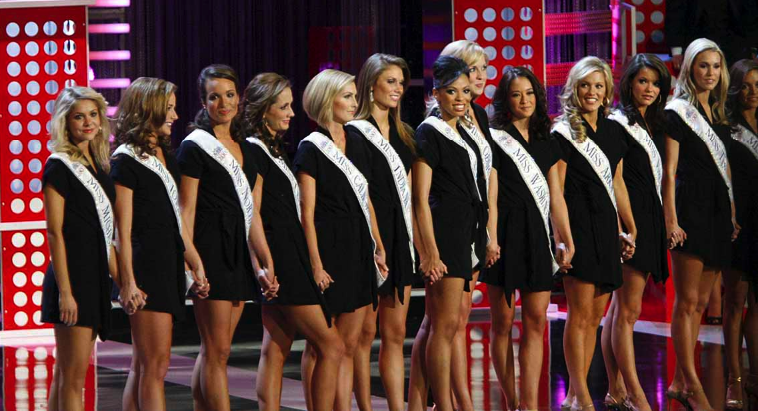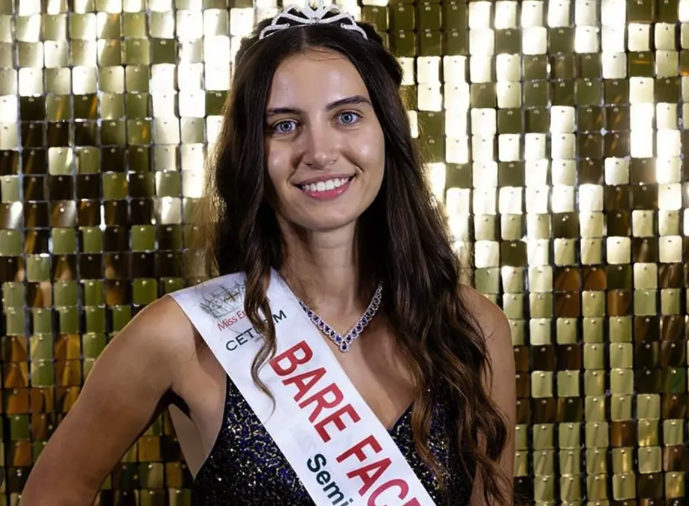One of the 40 finalists competing for the Miss England crown is 20-year-old Melisa Raouf.Raouf, on the other hand, was the only contestant in the pageant competing without any makeup and the first competitor to do so in 94 years.
She sought to encourage inner beauty and subvert social media’s representations of beauty standards.

It means a lot to me since I believe that many females of various ages wear makeup out of peer pressure, said Raouf.
“We shouldn’t be forced to wear makeup on our faces if we are content in our own skin. Every person is unique because of their shortcomings, which define who they are as people. Since we all know that true beauty is found in simplicity, I believe that people should appreciate and embrace their defects and imperfections.

Candidate for Miss England with Bare Face
The Miss England contestant this year is the first to decline to participate in the bare-face stage of the competition. Raouf described her decision as a “daunting but amazing experience.”
She also intends to compete makeup-free in the finals. When Raouf was a little girl, she began using cosmetics because she was self-conscious about her appearance.
I never thought I met beauty standards, she said. I chose to participate without any makeup since I recently realized that I am gorgeous in my natural flesh. Even if I’m completely hidden by cosmetics, I still have confidence in myself. I don’t hesitate to share who I am because this is who I am. I wanted to present Melisa as she really is.

Throughout the competition, several young girls and ladies stood by Raouf’s side since he had given them the self-assurance to feel better about their own beauty.
“I want to help all females feel wonderful, especially since that mental health is such a hot topic. Simply said, I want to get rid of all beauty standards. I believe that every female is attractive in her own unique way, and I believe that I have achieved this for all girls.
During the pageant, Raof advocates for children’s mental health and promotes Papyrus, a UK group focused to preventing teen suicide.

The Miss England pageant’s director, Angie Beasley, launched the bare-faced phase in 2019 after seeing that most of the contenders’ images were heavily edited and covered with makeup.
She wanted to empower women to “show us who they really are without needing to hide behind makeup and filters on social media,” and she planned to do that by encouraging them to do so. To participate, contestants had to post a photo of themselves online in which their faces were completely bare.
We wish her well in Miss England; it takes a lot of courage to compete without makeup when everyone else does, but she’s conveying a crucial message to young girls. Regarding Rauf, Beasley stated.

Body image, social media, and cosmetics
A person’s view and sentiments about their own physical appearance are, by definition, their body image. This perspective may be influenced by a wide range of factors, including assumptions, experiences, and generalizations. Although traditionally people have prized beauty, these standards have changed with time.
Social media and popular culture are continually upholding contemporary conventions, which has a significant impact on how people view their bodies.
A person with a negative body image is one who is frequently unhappy with their appearance. By contrasting themselves to others, they run the risk of severely judging themselves. They may experience the impulse to frequently examine their bodies in a mirror, on a scale, or with other tools.

People could also feel uncomfortable with and ashamed of their body. Poor body image can occasionally lead to unnecessary procedures, inappropriate weight loss methods, and mental health issues.
Body images can be influenced by messages that are broadcast by the media, society, family, and friends. The fashion and beauty industry in particular promote unfavorable perceptions of what is considered attractive.
As people mature, they often learn about the ideal appearance, which is actually artificial and unachievable. This has become an issue since individuals only post their most alluring photographs on social media. People consequently form incorrect ideas about how bodies should appear.
An insignificant 2018 study found a connection between problematic eating, a poor perception of one’s physique, and the amount of time spent on social media, particularly when users read content from models or fitness experts who place an emphasis on appearance.
On the other hand, if social media is used wisely, it can support the promotion of a positive body image.

If after browsing one feels bad about oneself, disengage for a while, whether it be a few hours, days, or weeks. Taking a nap can significantly boost one’s mood.
Unfollow accounts that depress you and make you feel inadequate as well as follow optimistic ones in their place. Find a group of receptive people who are likewise altering their viewpoints on notions of beauty.
Many body-positive accounts on Instagram discuss the realities of these norms and provide guidance on how to feel more at ease in one’s own flesh. Melisa Raouf, a finalist for Miss England, is one example of an influencer that promotes inner beauty.
A person who has a positive body image is comfortable with their appearance and has a healthy relationship with their body. It involves having a broad definition of beauty, appreciating one’s physique, and taking good care of one’s body.
Overall, it suggests that a person is striving for a stronger connection with their appearance despite external factors. Many people have the assumption that after they reach their ideal appearance, they will start to appreciate their bodies.

People should and can learn to appreciate their bodies, regardless of how they look. If you agree, kindly SHARE.






